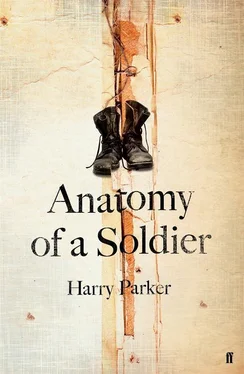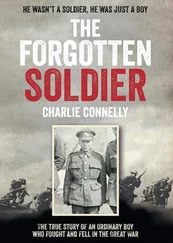My sensors can feel the angle of the floor, the speed you’re walking and the slope we’re on. I can prevent you from stumbling and stabilise you on stairs. I adapt to you.
The man sat on a stool with his laptop. He made it communicate with me and establish a wireless connection. He clicked an option, which sent to me, and my motor whirred into safe mode. ‘Right then,’ he said. ‘Whack it on, Tom.’
You pulled my black carbon-fibre socket onto your stump. The air pushed out as I slid onto you and the seal gripped. You wiggled your stump and I waved in the air.
‘Comfy?’ the man asked.
‘Feels fine,’ you said, rocking the socket with your hands.
‘It should be, I just copied your last leg.’
‘No, it feels great.’
‘Take a walk but be careful while I set it up,’ he said. ‘I’ll send it instructions from the computer. You might feel it change under you.’
As you walked around the treatment room, I felt odd beneath you, flicking out and swinging in a way you weren’t used to. The man continued sending me signals and I changed my parameters, dampening my cylinder and increasing my resistance. A burn developed in your thigh as you struggled to control me and you went up and down the bars, watching us in the mirror at the end of the room.
You leant over the parallel bars to rest, breathing heavily from the effort of controlling me.
‘How does it feel?’ the man asked.
‘Fine thanks, Mike,’ you lied. I felt odd and heavy at the end of your stump. You glanced over at your old leg, resting by the treatment bed. I was its replacement and meant to be an upgrade, but I was different and you weren’t used to me yet. You wished I moved more like the one you knew.
‘Great,’ the man said. ‘You’re doing well, it’ll just take a bit of time to get the hang of it.’
Slowly, with each adjustment, I improved: I didn’t kick up behind you or swing sluggishly and we started to walk more smoothly. You pushed through the socket to force me forward, creating energy that I bounced back off the floor to propel us on. We walked faster between the bars and then out in circuits of the room as your T-shirt grew wet with sweat.
The man suggested you should try some stairs, so you walked me out of the room and I oscillated on the socket below you. We went up and down a flight until you were exhausted. He changed my resistance, swing rate and extension so I was as good as he could get me. Then we were back on the treatment bed and you were sliding me away, pushing the valve to release the socket’s vacuum, and we separated.
You peeled the rubber liner off and your bare stump was red and hot and sweat dripped onto the floor.
‘Here, have this,’ he said and brought over a roll of blue tissue. ‘Weather’s hotter again. Not sure the heating’s been turned off yet.’
‘I’ve sweated buckets,’ you said.
‘What do you think to the leg?’
‘I need to get used to it,’ you said. ‘Still feels a bit odd, to be honest.’
‘It will for a bit, mate. But it looks like a massive improvement already. You’re walking well on it.’ He handed you my charger. ‘Try to plug it in every night, though the battery should last a few days.’
As you drove away from the rehabilitation centre, you looked down at me and felt disappointed. I wasn’t everything your dreams had promised. Your stumps still hurt and sweated, your back ached and your arms were strained from pulling us up the stairs. You were still an amputee. I couldn’t change that, couldn’t spring forward into a run below you or skip around obstacles or quickly adjust when you tripped. I was inert and restricted you to a frustrating walking pace.
*
A few days after we first joined, we were back in your car. Your other leg moved beside me. Like me it was made of metal and composites and it worked the pedals as you spun the wheel above me. The indicator clicked and we turned and stopped. You switched the car off and pulled the key out.
We were in a car park. You shut the door, clicked the key fob and the car blinked behind us. We walked and I swung, my sensors calculating how fast your stump thrust on and where you placed my foot, smoothly adjusting to your gait as we went through the automatic doors and picked up a blue basket.
We walked down the aisles and you held the basket beside me, adding vegetables and then something from a fridge cabinet that hummed next to me. Your stump started to hurt in my socket but you concentrated on your shopping list while my microprocessor adjusted as the basket became heavier.
People pushed their trolleys by and some didn’t notice; they reached for a tin or felt for unbruised apples, muttering to themselves. But others were transfixed by the grey-black rods of technology extending below your shorts instead of bare legs.
You saw them look and challenged them with a stare and they turned away embarrassed. You wished they wouldn’t look at us; we weren’t a freak show and you wanted to be ignored. But we were the strangest thing to walk down those aisles all day. As soon as we were past and they knew you couldn’t see them, they stopped picking tomatoes and stared at us walking away. They couldn’t resist watching and they wondered how we did it. We were science fiction, you and I, and they didn’t see the pain in your socket or the sweat collecting in your liners or the effort you expended to swing me down the bread aisle. All they saw was the magic of me and a young, upright man who had overcome the unsurvivable.
When you queued up to pay your stumps had gone numb and you thought about slumping back in the car. In front of us a young boy held his mother’s hand and pointed at the checkout display. ‘Please, Mum,’ he said.
‘No, Gerard,’ she told him. ‘You can have one when we get home.’
The boy looked up at her and back at the rows of sweets. He begged again and then noticed you queuing behind. He saw both of us but we were so odd he didn’t understand and he looked away in confusion. And then he was curious and turned back and stared at me. He couldn’t take his eyes off me and then he looked up at you.
You smiled at him but he turned his face away and tugged at his mother’s skirt.
‘Look, Mum. Look at that man.’ He was urgent.
‘Shhh, Gerard. Not now,’ she said, then glanced down at me, smiled at you and turned away.
‘But, Mummy, that man’s a robot. Look,’ he said. His eyes pleaded with her and he tugged at her again and pointed at me.
She turned back to you and rested a hand on the boy’s head. ‘Sorry, love,’ she said.
‘Don’t worry.’ You smiled at the boy again. ‘I’m actually only half robot.’
But he buried his head in her skirt away from you and then they funnelled down to the checkout. He kept glancing back at us as he held on to her and she filled shopping bags.
Back in the car, you lifted me into the footwell and closed the door. The remains of your femoral artery throbbed against my socket. You dropped your head back against the seat and your eyes were closed and your mouth hung open. You pushed the key in but then paused and saw the orange shopping bags you’d placed on the passenger seat and you looked down at me.
You remembered the bang, the pain and the loneliness on the helicopter. You remembered the men who’d pulled you off the battlefield and being broken in hospital with tubes and drugs invading you. You remembered wishing you’d never been saved. You remembered: ‘We’ve just had to amputate your second leg.’
You remembered everyone who’d helped you: the nurses who’d gently washed you and the doctors who’d cut more of you away to save you, the physio and ‘squeeze those glutes’, the man who gave me to you.
You remembered the last time you’d carried shopping bags, before you’d been to that distant country, when you didn’t need me, and it was a lifetime ago. You remembered your friends and your family and ‘a nice cup of tea’. You smiled at the shopping bags and turned the key.
Читать дальше












